外研版英语(一起)五上Module 8《Unit 1 Children often sit around tables》公开课课件
- 格式:ppt
- 大小:4.93 MB
- 文档页数:53
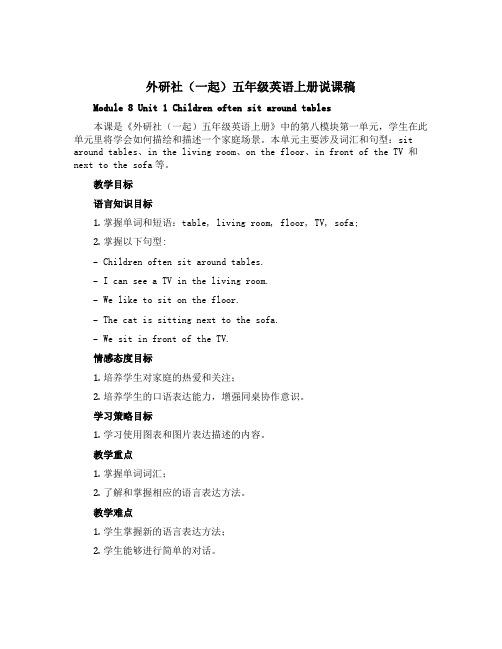
外研社(一起)五年级英语上册说课稿Module 8 Unit 1 Children often sit around tables本课是《外研社(一起)五年级英语上册》中的第八模块第一单元,学生在此单元里将学会如何描绘和描述一个家庭场景。
本单元主要涉及词汇和句型:sit around tables、in the living room、on the floor、in front of the TV 和next to the sofa等。
教学目标语言知识目标1.掌握单词和短语:table, living room, floor, TV, sofa;2.掌握以下句型:–Children often sit around tables.–I can see a TV in the living room.–We like to sit on the floor.–The cat is sitting next to the sofa.–We sit in front of the TV.情感态度目标1.培养学生对家庭的热爱和关注;2.培养学生的口语表达能力,增强同桌协作意识。
学习策略目标1.学习使用图表和图片表达描述的内容。
教学重点1.掌握单词词汇;2.了解和掌握相应的语言表达方法。
教学难点1.学生掌握新的语言表达方法;2.学生能够进行简单的对话。
教学过程1. 导入新课教师可以通过展示家庭照片或提供图示以引起学生的兴趣。
然后以”家庭装饰“为主题展开。
2. 呈现新知识通过图片的形式展示各类不同的家居装修布置,让学生根据图片来描述办公室的家靠的环境,如地毯、沙发、电视机等。
让学生前后对比,对家的布置有一个较为清晰的认识。
3. 小组活动让学生分组进行活动,每个小组请讨论办公室应如何布置才更美观大方,自己小组必须共同协作完成任务。
4. 课堂展示请学生向全班展示他们小组预备的图片,让其他小组进行评价与分享内部的设计成果。
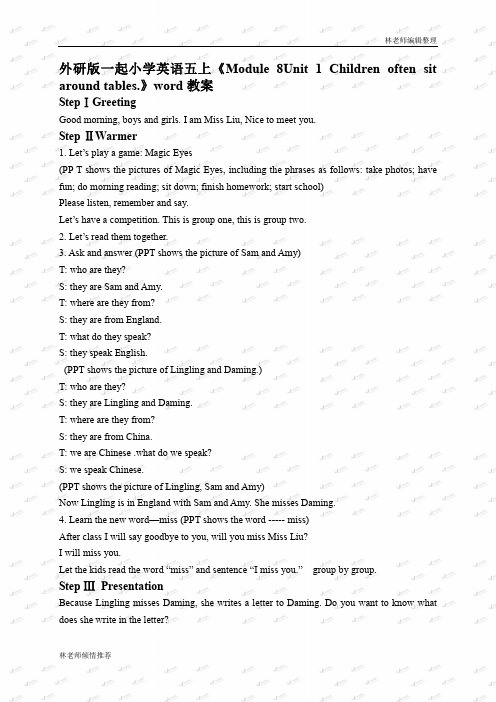
外研版一起小学英语五上《Module 8Unit 1 Children often sit around tables.》word教案StepⅠGreetingGood morning, boys and girls. I am Miss Liu, Nice to meet you.Step ⅡWarmer1. Let’s play a game: Magic Eyes(PP T shows the pictures of Magic Eyes, including the phrases as follows: take photos; have fun; do morning reading; sit down; finish homework; start school)Please listen, remember and say.Let’s have a competition. This is group one, this is group two.2. Let’s read them together.3. Ask and answer (PPT shows the picture of Sam and Amy)T: who are they?S: they are Sam and Amy.T: where are they from?S: they are from England.T: what do they speak?S: they speak English.(PPT shows the picture of Lingling and Daming.)T: who are they?S: they are Lingling and Daming.T: where are they from?S: they are from China.T: we are Chinese .what do we speak?S: we speak Chinese.(PPT shows the picture of Lingling, Sam and Amy)Now Lingling is in England with Sam and Amy. She misses Daming.4. Learn the new word—miss (PPT shows the word ----- miss)After class I will say goodbye to you, will you miss Miss Liu?I will miss you.Let the kids read the word “miss” and sentence “I miss you.” group by group.Step ⅢPresentationBecause Lingling misses Daming, she writes a letter to Daming. Do you want to know what does she write in the letter?(PPT show a picture of letter.)Today we are going to learn Module 8, Unit 11. Let’s listen and answer. The questions are as follows:①Did Lingling go to Sam and Amy’s school?Yes, she went to Sam and Amy’s school.②Does she miss Chinese school?Yes, she misses Chinese school.2. Read silently and choose the correct answer①Chinese children sit in lines.A sit in linesB sit around table3. Learn the new word---- lineThis is line one. This is line two. Line one. Stand up. We stand in lines. Sit down please. We sit in lines. (Teacher writes it on the blackboard)②English children sit ________tables.A aroundB inThey sit around tables③Chinese children do _____ every morning.A morning exercisesB eyes exercises4. Learn the new word---exercisesmorning exercisesThey do morning exercises. (Teacher writes it on the blackboard)We do eyes exercises④English children __________ every morning.A do morning readingB sing songs togetherWe do morning reading. (Teacher writes it on the blackboard)They sing songs every morning. (Teacher writes it on the blackboard)5. Listen again, Tick or Cross.①English children sit around tables in classroom. ( ).②Chinese children don’t sit in lines in classroom. ( )③Chinese school finishes at 4 o’clock . ( )④English school starts at 8 o’clock. ( )6. Read the sentences line by line.In England, school starts at 9 o’clock.In China, school starts at 8 o’clock7. read after the CD-ROMStep Ⅳpractice1. read loudly, then fill in the blanksschool lifeWe sit in_________.We start school at_______.We finish at _______We do morning ______ every morning.School life They sit _________tables.They start school at _________.They finish at __________.They sing _______every morning.2. Retell the letter according to the pictures. InEngland, the children sit around tables.We sit in lines in China.They sing songs together every morning.We do morning exercises.In England, school starts at 9 o’clock.It finishes at half past 3.In China, we start school at 8 o’clock and finishes at 4 o’clock.3. read the material then answer the questions.There are so many differences between Chinese people and English people.In daily life, we speak Chinese, they speak English. We like eating rice and noodles, but they like eating hamburger and chips. We use chopsticks to eat, however, they use knife and fork to eat food. In England, people like drinking coffee and milk. We like drinking tea.In school life, we do morning reading, and we also do morning exercises every morning. Yet they sing hymns in the morning. (Hymns are the religious songs.) We sit in lines in classroom, and they sit around table. In England, there is only one teacher to teach all the subjects in a class, but we have many teachers teach different subjects in a class. What’s more, their classroom is named by the teacher’s name, but our classroom is named by numbers. We start school at 8 o’clock and finish at 4 o’clock, but they start school at 9 o’clock and finish at half past 3.Despite the differences, both of the schools are fun.Questions: T or F①English people like drinking tea . T or F②There is only one teacher in a class in China T or F③Classroom is named by teacher’s name in England. T or F4. Could you find more differences in this material? Please discuss with your partner.5. L let’s chantThey speak English, we speak Chinese.They use knife and fork, we use chopsticks.They like hamburgers, we like rice.They like coffee, we like tea.They and we, be happy.Step ⅤHomeworkCollect more materials about the differences between China and England.。
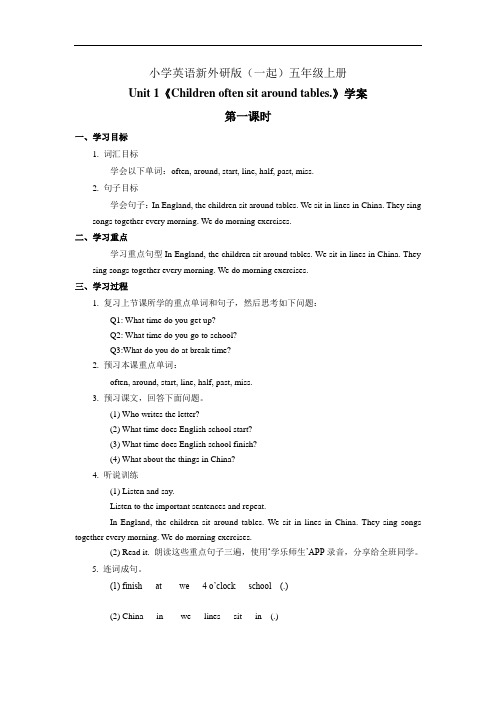
小学英语新外研版(一起)五年级上册Unit 1《Children often sit around tables.》学案第一课时一、学习目标1. 词汇目标学会以下单词:often, around, start, line, half, past, miss.2. 句子目标学会句子:In England, the children sit around tables. We sit in lines in China. They sing songs together every morning. We do morning exercises.二、学习重点学习重点句型In England, the children sit around tables. We sit in lines in China. They sing songs together every morning. We do morning exercises.三、学习过程1. 复习上节课所学的重点单词和句子,然后思考如下问题:Q1: What time do you get up?Q2: What time do you go to school?Q3:What do you do at break time?2. 预习本课重点单词:often, around, start, line, half, past, miss.3. 预习课文,回答下面问题。
(1) Who writes the letter?(2) What time does English school start?(3) What time does English school finish?(4) What about the things in China?4. 听说训练(1) Listen and say.Listen to the important sentences and repeat.In England, the children sit around tables. We sit in lines in China. They sing songs together every morning. We do morning exercises.(2) Read it. 朗读这些重点句子三遍,使用‘学乐师生’APP录音,分享给全班同学。

小学(外研)英语资料外研版(一起)五年级英语上册教案Module 8 unit l They sit around tables.一、教学目标与要求1.知识与能力目标掌握听说词汇:miss掌握听说读词汇:aroud, exercise掌握听说读写词汇:sit, table. line morning掌握句型:In England, they sit around tables. We sit in lines in China. They sing songs together every morning. We do morning exercises.2. 情感态度目标:了解中西方学校在各方面的差异,热爱自己的学校。
二、教学重点及难点:掌握中西方学校的几个差异及动词词组的发音、使用.三、课前准备:单词卡、CAI四、教学过程Step1 Warm upFree talkLook, this is our school. Do you like our school?What is our school like?( 出示我们学校的图片,引导学生描述学校)T :Our school is very beautiful.Step2 Presentation and practice1. 学习词汇table.We’re in a classroom. There are some tables. (table-----tables)注意强调双元音/ ei / 的发音2. 学习词汇line sit We sit in lines. They sit around tables.教师辅以肢体动作并举例。
引导学生理解sit 、line around 的含义。
Sa Sb Sc and Sd sit in line.Se Sf Sg sit in line.We sit in lines in China.操练sit in lines教师请几名学生到教室前已摆好的桌子前面对面坐好T :They sit around tables.小Chant :sit sit, sit in lines, sit sit, sit around tables.3. 学习课文This is a Chinese school . Do you know about the schools in England? Let’s watch TV and find the answers.( 播放前两段录音)What did Lingling do yesterday?What do they do every morning?What do we do every morning?(Practice in pairs.)She took photos.They sing songs together every morning.We do morning exercises.就学生的回答学习took photos. sing songs. do morning exercises.练习词组并加以肢体动作。
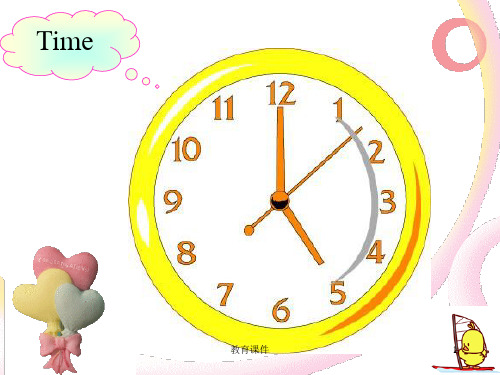
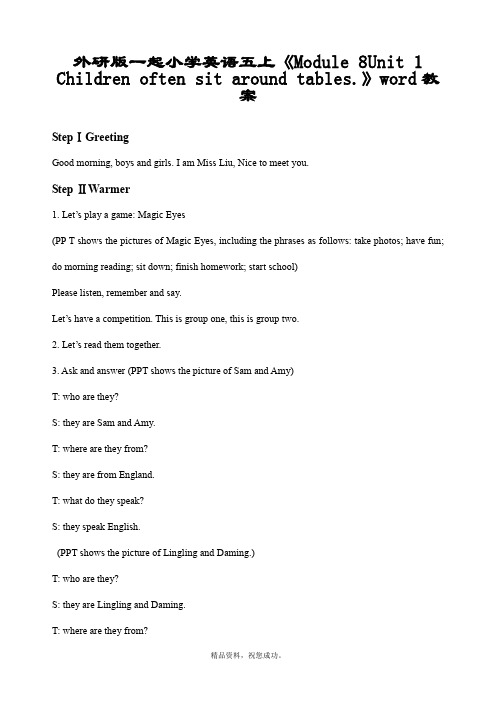
外研版一起小学英语五上《Module 8Unit 1 Children often sit around tables.》word教案StepⅠGreetingGood morning, boys and girls. I am Miss Liu, Nice to meet you.Step ⅡWarmer1. Let’s play a game: Magic Eyes(PP T shows the pictures of Magic Eyes, including the phrases as follows: take photos; have fun; do morning reading; sit down; finish homework; start school)Please listen, remember and say.Let’s have a competition. This is group one, this is group two.2. Let’s read them together.3. Ask and answer (PPT shows the picture of Sam and Amy)T: who are they?S: they are Sam and Amy.T: where are they from?S: they are from England.T: what do they speak?S: they speak English.(PPT shows the picture of Lingling and Daming.)T: who are they?S: they are Lingling and Daming.T: where are they from?S: they are from China.T: we are Chinese .what do we speak?S: we speak Chinese.(PPT shows the picture of Lingling, Sam and Amy)Now Lingling is in England with Sam and Amy. She misses Daming.4. Learn the new word—miss (PPT shows the word ----- miss)After class I will say goodbye to you, will you miss Miss Liu?I will miss you.Let the kids read the word “miss” and sentence “I miss you.” group by group.Step ⅢPresentationBecause Lingling misses Daming, she writes a letter to Daming. Do you want to know what does she write in the letter?(PPT show a picture of letter.)Today we are going to learn Module 8, Unit 11. Let’s listen and answer. The questions are as follows:①Did Lingling go to Sam a nd Amy’s school?Yes, she went to Sam and Amy’s school.②Does she miss Chinese school?Yes, she misses Chinese school.2. Read silently and choose the correct answer①Chinese children sit in lines.A sit in linesB sit around table3. Learn the new word---- lineThis is line one. This is line two. Line one. Stand up. We stand in lines. Sit down please. We sit in lines. (Teacher writes it on the blackboard)②English children sit ________tables.A aroundB inThey sit around tables③Chinese children do _____ every morning.A morning exercisesB eyes exercises4. Learn the new word---exercisesmorning exercisesThey do morning exercises. (Teacher writes it on the blackboard)We do eyes exercises④English children __________ every morning.A do morning readingB sing songs togetherWe do morning reading. (Teacher writes it on the blackboard)They sing songs every morning. (Teacher writes it on the blackboard)5. Listen again, Tick or Cross.①English children sit around tables in classroom. ( ).②Chinese children don’t sit in lines in classroom. ( )③Chinese school finishes at 4 o’clock . ( )④English school starts at 8 o’clock. ( )6. Read the sentences line by line.I n England, school starts at 9 o’clock.In China, school starts at 8 o’clock7. read after the CD-ROMStep Ⅳpractice1. read loudly, then fill in the blanks2. Retell the letter according to the pictures. InEngland, the children sit around tables.We sit in lines in China.They sing songs together every morning.We do morning exercises.In England, school starts at 9 o’clock.It finishes at half past 3.In China, we start school at 8 o’clock and finishes at 4 o’clock.3. read the material then answer the questions.There are so many differences between Chinese people and English people.In daily life, we speak Chinese, they speak English. We like eating rice and noodles, but they like eating hamburger and chips. We use chopsticks to eat, however, they use knife and fork to eat food. In England, people like drinking coffee and milk. We like drinking tea.In school life, we do morning reading, and we also do morning exercises every morning. Yet they sing hymns in the morning. (Hymns are the religious songs.) We sit in lines in classroom, and they sit around table. In England, there is only one teacher to teach all the subjects in a class, but we have many teachers teach different s ubjects in a class. What’s more, their classroom is named by the teacher’s name, but our classroom is named by numbers. We start school at 8 o’clock and finish at 4 o’clock, but they start school at 9 o’clock and finish at half past 3. Despite the differences, both of the schools are fun.Questions: T or F①English people like drinking tea . T or F②There is only one teacher in a class in China T or F③Classroom is named by teacher’s name in England. T or F4. Could you find more differences in this material? Please discuss with your partner.5. L let’s chantThey speak English, we speak Chinese.They use knife and fork, we use chopsticks.They like hamburgers, we like rice.They like coffee, we like tea.They and we, be happy.Step ⅤHomeworkCollect more materials about the differences between China and England.。
外研版一起小学英语五上《Module 8Unit 1 Children often sit around tables.》word教案StepⅠGreetingGood morning, boys and girls. I am Miss Liu, Nice to meet you.Step ⅡWarmer1. Let’s play a game: Magic Eyes(PP T shows the pictures of Magic Eyes, including the phrases as follows: take photos; have fun; do morning reading; sit down; finish homework; start school)Please listen, remember and say.Let’s have a competition. This is group one, this is group two.2. Let’s read them together.3. Ask and answer (PPT shows the picture of Sam and Amy)T: who are they?S: they are Sam and Amy.T: where are they from?S: they are from England.T: what do they speak?S: they speak English.(PPT shows the picture of Lingling and Daming.)T: who are they?S: they are Lingling and Daming.T: where are they from?S: they are from China.T: we are Chinese .what do we speak?S: we speak Chinese.(PPT shows the picture of Lingling, Sam and Amy)Now Lingling is in England with Sam and Amy. She misses Daming.4. Learn the new word—miss (PPT shows the word ----- miss)After class I will say goodbye to you, will you miss Miss Liu?I will miss you.Let the kids read the word “miss” and sentence “I miss you.” group by group.Step ⅢPresentationBecause Lingling misses Daming, she writes a letter to Daming. Do you want to know what does she write in the letter?(PPT show a picture of letter.)Today we are going to learn Module 8, Unit 11. Let’s listen and answer. The questions are as follows:①Did Lingling go to Sam and Amy’s school?Yes, she went to Sam and Amy’s school.②Does she miss Chinese school?Yes, she misses Chinese school.2. Read silently and choose the correct answer①Chinese children sit in lines.A sit in linesB sit around table3. Learn the new word---- lineThis is line one. This is line two. Line one. Stand up. We stand in lines. Sit down please. We sit in lines. (Teacher writes it on the blackboard)②English children sit ________tables.A aroundB inThey sit around tables③Chinese children do _____ every morning.A morning exercisesB eyes exercises4. Learn the new word---exercisesmorning exercisesThey do morning exercises. (Teacher writes it on the blackboard)We do eyes exercises④English children __________ every morning.A do morning readingB sing songs togetherWe do morning reading. (Teacher writes it on the blackboard)They sing songs every morning. (Teacher writes it on the blackboard)5. Listen again, Tick or Cross.①English children sit around tables in classroom. ( ).②Chinese children don’t sit in lines in classroom. ( )③Chinese school finishes at 4 o’clock . ( )④English school starts at 8 o’clock. ( )6. Read the sentences line by line.In England, school starts at 9 o’clock.In China, school starts at 8 o’clock7. read after the CD-ROMStep Ⅳpractice1. read loudly, then fill in the blanks2. Retell the letter according to the pictures.InEngland, the children sit around tables.We sit in lines in China.They sing songs together every morning.We do morning exercises.In England, school starts at 9 o’clock.It finishes at half past 3.In China, we start school at 8 o’clock and finishes at 4 o’clock.3. read the material then answer the questions.There are so many differences between Chinese people and English people.In daily life, we speak Chinese, they speak English. We like eating rice and noodles, but they like eating hamburger and chips. We use chopsticks to eat, however, they use knife and fork to eat food. In England, people like drinking coffee and milk. We like drinking tea.In school life, we do morning reading, and we also do morning exercises every morning. Yet they sing hymns in the morning. (Hymns are the religious songs.) We sit in lines in classroom, and they sit around table. In England, there is only one teacher to teach all the subjects in a class, but we have many teachers teach different subjects in a class. What’s more, their classroom is named by the teacher’s name, but our classroom is named by numbers. We start school at 8 o’clock and finish at 4 o’clock, but they start school at 9 o’clock and finish at half past 3.Despite the differences, both of the schools are fun.Questions: T or F①English people like drinking tea . T or F②There is only one teacher in a class in China T or F③Classroom is named by teacher’s name in England. T or F4. Could you find more differences in this material? Please discuss with your partner.5. L let’s chantThey speak English, we speak Chinese.They use knife and fork, we use chopsticks.They like hamburgers, we like rice.They like coffee, we like tea.They and we, be happy.Step ⅤHomeworkCollect more materials about the differences between China and England.小学英语日常交际用语一、日常问候和答语1. Hello/ Hi你好。